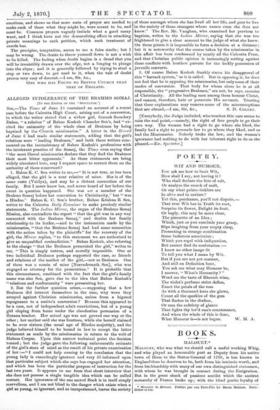ALLEGED INTOLERANCE OF THE BRAHMO SOMAJ.
[TO THE EDITOR OF TRH "SPECTATOR."]
Srn,—The Times of June 13 contained an account of a recent case before the Calcutta High Court, arising out of a conversion, in which the writer stated that a widow girl, Gunesh Soondery Dabee, "a relation" of Baboo Keshub Chunder Sen's, had "ex- cited the animosity of the whole class of Brahmos by being baptized by the Church missionaries." A letter in the Record of June 6 had made similar statements, adding that the girl's relations were "leading Brahmos," and both these writers com- mented on the inconsistency of Baboo Keshub's professions with the intolerant practice of the Somaj, the Times even saying that "the most liberal missionaries declare that they find the Brahmos their most bitter opponents." As these statements are being widely circulated here, may I request space to correct them on the authority of those concerned?
1. Baboo K. C. Sen writes to me,—" It is not true, as has been alleged, that the girl is a near relative of mine. She is of the same caste (Vaidya), and may be a distant connection of our family. But I never knew her, and never heard of her before the event in question happened. She was not a member of the Brahmo Somaj before her conversion to Christianity," but "was a Hindoo." Baboo K. C. Sen's brother, Baboo Krishna B. Sen, writes to the Calcutta Daily Examiner to make precisely similar statements. The Indian Mirror, the organ of the Brahmo Somaj Mission, also contradicts the report "that the girl was in any way connected with the Brahmo Somaj," and doubts her family relationship to its leader,—and to the insinuation made by the missionaries, "that the Brahmo Somaj had had some connection with the action taken by the plaintiffs" for the recovery of the girl, the Mirror replies, "to this statement we are authorized to give an unqualified contradiction." Baboo Keshub, also referring to the charge "that the Brahmos persecuted the girl," writes to me, "This is simply untrue, and morally impossible. One or two individual Brahmos perhaps supported the case, as friends and relations of the mother of the girl,—not as Brahmos. One of them was a cousin of mine [Norendronath Sell], who was engaged as attorney for the prosecution." It is probable that this circumstance, combined with the fact that the girl's family name was also Sen, gave rise to the idea that Baboo Keshnb's "relations and confraternity" were persecuting her.
2. But the further question arises,— supposing that a few Brahmos did interest themselves in the case, why were they arrayed against Christian missionaries, unless from a bigoted repugnance to a native's conversion ? Because this appeared to be a case, not of independant adult convictions, but of a young girl eloping from home under the clandestine persuasion of a Zenana teacher. Her actual age was not proved one way or the other ; her mother said she was fourteen, while she herself claimed to be over sixteen (the usual age of Hindoo majority), and the judge believed himself to be bound in law to accept the latter statement as made by the missionaries in return to the writ of Habeas Corpus. Upon this narrow technical point the decision turned ; but the judge gave the following unfavourable estimate of the girl's state of mind as the result of his private examination of her :—" I could not help coming to the conclusion that the young lady is exceedingly ignorant and very ill-informed upon that particular subject which she says has engaged her attention, and which has been the particular purpose of instruction for the last two years. It appears to me from that short interview that she does not possess a single tangible idea which can be called correct. Her ignorance of the one sacred Book is in itself simply marvellous, and I am not blind to the danger which exists when a girl so young, so ignorant, and so inexperienced, leaves the society of those amongst whom she has lived all her life, and goes to live in the society of those strangers whose names even" she does not know." The Rev. Mr. Vaughan, who examined her previous to baptism, writes to the Indian Mirror, saying that she was too frightened to give a clear account to the judge of what she knew. On these points it is impossible to form a decision at a distance ; but it is noteworthy that the course taken by the missionaries in this affair has been condemned by nearly all the Calcutta Press, and that Christian public opinion is increasingly setting against these conflicts with heathen parents for the bodily possession of juvenile converts.
3. Of course Baboo Keshub frankly states his disapproval of this "barrack system," as it is called. But in opposing it, he does not feel that he is opposing the missionaries, but only some o their modes of conversion. That body for whom alone he is at all responsible, the "progressive Brahmos," are not, he says, enemies of Christianity. All the leading men among them honour Christ, and cannot, therefore, hate or persecute His servants. Trusting that these explanations may remove some of the misconceptions that are abroad,—I am, Sir, &c., S. D. COLLET.
[Everybody, the Judge included, who touches this case seems to miss the real point,—namely, the right of free people to go their own way. The woman had a right to go where she liked, the family had a right to persuade her to go where they liked, and so had the Missionaries. Nobody broke the law, and the woman's ignorance had nothing to do with her inherent right to do as she pleased.—ED. Spectator.]






























 Previous page
Previous page